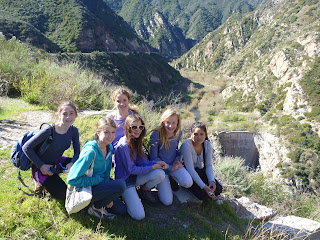When we no longer know what to do
we have come to our real work and when we no longer know
which way to go we have begun our
real journey. The mind that is not
baffled is not employed. The
impeded stream is the one that
sings.
Wendell Berry
Teacher Guided Investigation (TGIs): Our science-teaching program will continue to emphasize direct experience of inquiry and experimentation in the natural world outside of the classroom. Students will begin the year by developing a testable question that will investigate the near coastal ocean and sandy shore environment in which we all live. After identifying a significant topic they will design and perform either an experiment or a descriptive investigation. Small groups of students (3/group) will choose personally interesting topics from a menu of marine science topics; meanwhile, I will be modeling and directing the inquiry processes by performing an investigation of my own alongside them. 7th graders will examine physical or chemical processes and SMASHing seniors will apply themselves to one of the six unifying principles of marine biology in an effort to increase their readiness for high school biology learning.
Timing: This project runs from late Sept and concludes in January.
Place-Based Stewardship Action Project (PSAPs): As
the holiday season draws to a close and we are all feeling full of love we will
turn our attention directly to caring for our planet. Student Action Teams (SATs) will select a local, regional, or
globally important place to nurture and find a way to positively influence the
place. Teacher directed research into Regional
Biogeograhy and environmental sustainability
shall play a significant supporting role in the project; however, the intent of
this project is to help kids learn how to translate good intentions into
meaningful action. In each case students will have to learn the natural history
of their selected place, research local organizations, and define the issues carefully
before acting, but the continued emphasis will be on the ultimate effectiveness
of the action. We shall use local university partners (USC/UCLA), NGOs, and
parents to guide/aid us in this work and learning how to collaborate effectively
outside of the school environment is a critical piece of the intended learning
objective. Students will have the option of continuing this work into the third
trimester contingent on the quality of their learning and service.
Timing: Scheduled for Feb through April. Particularly motivated
learners may need to begin working earlier then this to match scheduled events
of our partners. USC’s Quick-Science Project, for example, will begin before
the holidays with dates to be determined.
Student Interest Based Inquiry Investigation (SIBIs): Following
spring break we begin a new investigation cycle that will be entirely student
generated with coaching from teachers, alumni tutors, and mentors from local
colleges. These individual investigations may be experimental in nature,
research based, or a data mining experience, but will have to examine
significant matters drawn from life science, Planned-Parenthood, or teen
topics. The topic may involve any class here at SMASH, be thematically linked
to other class work, or be something completely to academics.
Evaluation: Students will keep a working portfolio that will go home weekly for parent check and
signature. Individual learners/peers or
an adult will review them bi-weekly. Activities and investigations will be photo/video documented and made available to
parents. As a high school prep strategy, students will occasionally take quizzes and tests. No grades will
result as this practice is a learning exercise meant to teach the pragmatic
skill of test taking! Weekly progress reports/reflections
will be written by each learner and sent home on Friday.
One is a matter of quality, the
other, a matter of time.
Marabel Morgan,
The
Electric Woman




No comments:
Post a Comment